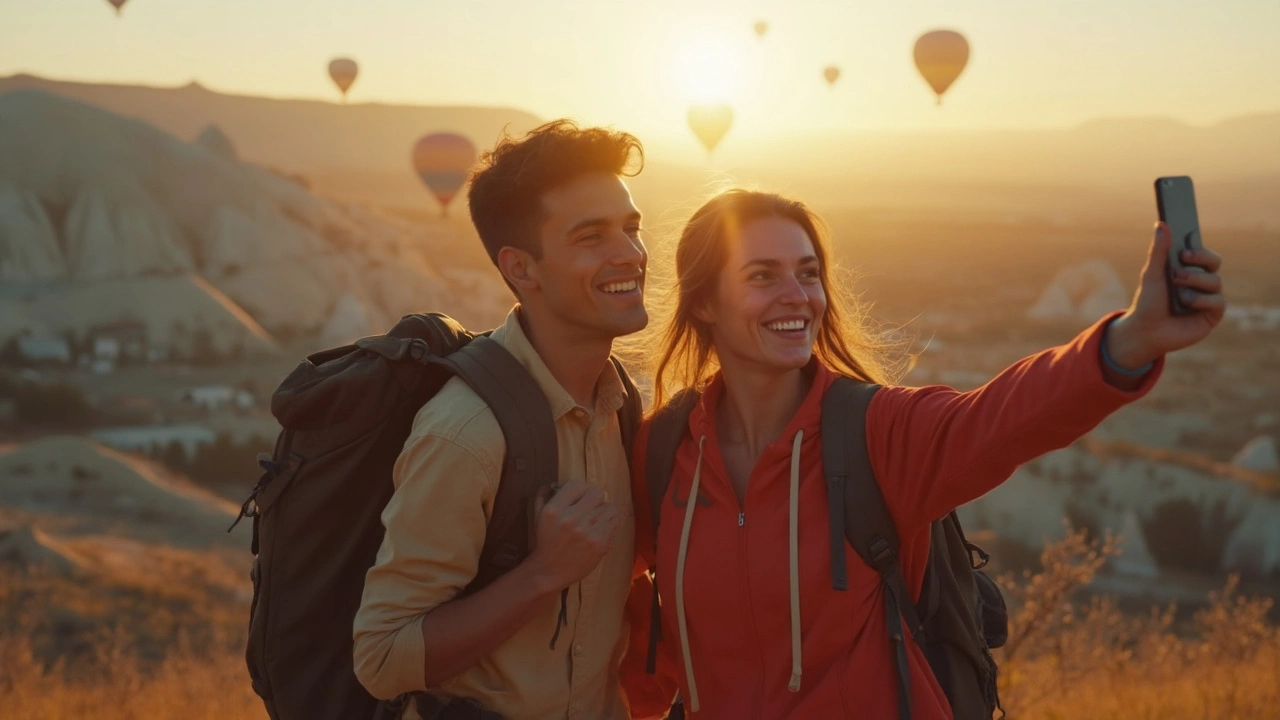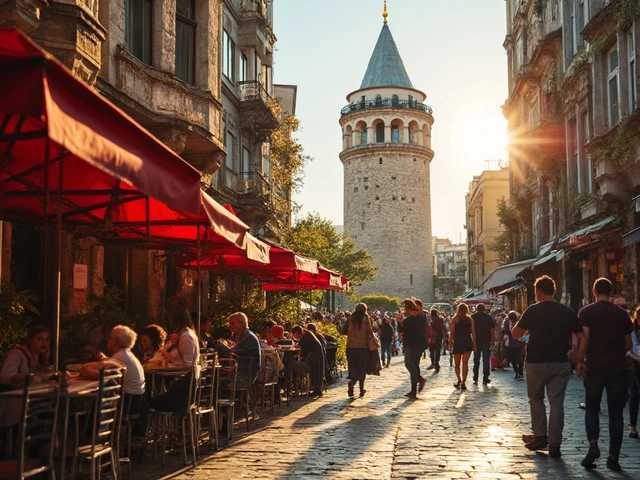Ever tried to explain a crazy travel story and felt like nobody truly got it? That’s the magic of having a travel buddy—someone who actually lived those moments right next to you. Sure, solo trips can be freeing, but sharing the adventure packs in double the laughs, extra safety, and memories you keep quoting for years.
Traveling with someone else means you’ve got backup if plans go sideways, someone to bounce ideas off of when picking dinner spots, and a built-in photographer for those can’t-miss moments. You’re less likely to get lost, ripped off, or just bored. Plus, some group activities or accommodations even give you a better deal if you’re more than one.
But finding a travel buddy isn’t about just picking anyone who’s free. It’s about matching energy and travel style—do you love early morning hikes, or are you more of a midnight street food explorer? Getting the right fit can turn a good trip into an unforgettable one. There are real tricks to spotting the perfect partner, and a few warning signs to dodge too. Let’s break down what matters most in finding (and being) the ultimate travel buddy.
- What Makes a Great Travel Buddy
- Top Benefits of Traveling Together
- How to Find Your Ideal Travel Partner
- Tips for a Smooth Experience
What Makes a Great Travel Buddy
Picking the right travel buddy can make or break your entire trip. It's not about finding someone who's always available—it's about choosing a partner who's compatible with you in the ways that really count. Think of it like drafting your ultimate road trip playlist, only this time, the 'songs' have opinions, moods, and snoring habits.
Key qualities of a great travel buddy aren't rocket science, but they're absolutely critical:
- Flexibility: Travel throws curveballs—delays, missed trains, lost luggage. A great buddy rolls with it and helps you find plan B (or C) without losing their cool.
- Similar travel style: If you’re all about museums but your buddy just wants to hit up clubs, there’s bound to be tension. Talk about your top priorities and budget before you lock in your plans.
- Good communication: You need someone who actually speaks up. Whether it’s about splitting costs, swapping beds, or choosing what to eat, honest chats save so many headaches.
- Respect for personal space: No matter how tight-knit, everyone needs a breather. The best buddies know when to give you room to decompress after a long day.
- Reliability: You don’t want a flake. A reliable travel partner shows up on time, sticks to agreed plans, and helps out with logistics.
Here’s a quick snapshot of what folks say really matters, based on a travel survey from 2024 involving seasoned backpackers, couples, and even strangers who teamed up for group trips:
| Quality | % Travelers Who Value This |
|---|---|
| Flexibility | 84% |
| Good Communication | 81% |
| Reliability | 75% |
| Shared Interests | 72% |
| Respect for Personal Space | 68% |
Don’t forget—healthy disagreement is inevitable, but how someone handles disagreements says a lot. If your partner can debate whether to try the local street food or not without getting annoyed, you’ll likely get through bigger bumps later on. Always do a one-day “test trip” if you can: explore a neighboring city or even just spend a full day out together. It’s the fastest way to sniff out any red flags before you’re stuck together in a faraway country.
At the end of the day, a top-notch travel buddy doesn’t just tag along—they help turn challenges into inside jokes and memories you’ll never forget.
Top Benefits of Traveling Together
Traveling with a buddy comes with some real, concrete perks. The most obvious one? You’re never alone if things get sketchy. According to a 2023 survey by Hostelworld, 67% of travelers reported feeling safer when exploring with a partner. Safety in numbers isn’t just a saying—it’s a real thing, especially in new or bustling cities where tourists can be targets for scams or pickpocketing.
Another big win: you end up saving money. Split costs like accommodation, taxis, and sometimes even meals, and you’ll usually have more budget left for extra experiences. For example, many hotels and homestays offer discounts for double occupancy rather than charging per person. Check this out:
| Expense | Solo Traveler | With Travel Buddy |
|---|---|---|
| Basic Hotel (per night) | $80 | $45 each |
| Taxi (airport to city) | $40 | $20 each |
| Private Tour | $100 | $55 each |
Then there’s the whole emotional and mental side of things. Got lost? At least you’ll laugh about it together instead of stressing alone. A study from the Global Wellness Institute found that shared experiences can reduce travel anxiety by up to 30%. That’s not just ‘feel good’ talk—it’s supported by science.
Let’s not forget flexibility and decision-making. With two brains on the job, you’ll find faster solutions when stuff goes wrong—missed trains, language barriers, or a last-minute cancellation. Plus, sharing the load means you can take turns planning, navigating, or just chilling while the other handles logistics.
So, what exactly makes traveling with a travel buddy so much better?
- More safety in unfamiliar places
- Bigger savings on major expenses
- Less stress, more support
- Quicker problem-solving
- Shared memories that last way longer
- Built-in photographer—no more awkward selfies
In short, traveling with someone usually means smarter choices, more fun, and better stories to tell down the road.

How to Find Your Ideal Travel Partner
Finding the right person to hit the road with isn’t luck—it’s about clear choices. About 62% of travelers say picking the wrong buddy led to stress or even cutting a trip short. So, if you want a travel buddy who adds to the adventure (not the drama), here’s what actually works.
- Know Your Own Style First. Are you early to the airport or sprinting to the gate last minute? Do you want museums, or street food hawkers? Before anything, nail down what you want out of your trip. If your styles are too different, it’s endless compromise or non-stop arguments.
- Ask Around Your Friend Circle. Don’t overthink it: most people find their best travel partners among friends or friends-of-friends. Be upfront—share your travel plans and style, and see who bites.
- Use Apps and Groups. Sites like Travello, Backpackr, and Facebook travel buddy groups connect travelers looking for the same experience. On Couchsurfing, you’ll find big forums for travel meetups and journey matchups.
- Have a Pre-Trip Chat. Video call or meet for coffee—seriously, don’t skip this. Talk about daily budgets, sleep habits, big dreams, and little pet peeves. Winging it with a stranger is risky (and can end in awkward midnight arguments).
- Try a Short Weekend First. If you’ve never traveled together, start small. Nothing reveals travel habits like two days navigating airport chaos or sharing tiny hostel rooms.
Want to size up your potential travel partner? These three questions save a lot of trouble:
- What’s your budget comfort zone?
- What’s your must-see for this trip?
- How do you handle setbacks (missed flights, closed attractions, lost luggage)?
You can even turn finding a travel buddy into a science. Check out the stats in the table below, based on a 2024 survey from Hostelworld on travel partnership success:
| Factor | Travelers Who Prioritized It | % With Positive Experiences |
|---|---|---|
| Similar budget | 81% | 92% |
| Compatible personalities | 77% | 89% |
| Shared interests & activities | 69% | 85% |
| Willingness to compromise | 54% | 80% |
The bottom line? People who chat through expectations and check vibes before booking win big. Don’t just settle for whoever is available—find someone who fits, and your trip goes from just okay to “let’s do that again.”
Tips for a Smooth Experience
Traveling with a buddy seems easy, but even the best trips can hit bumps if you’re not on the same page. You want tons of memories, not pointless arguments over where to eat or what bus to take. Let’s get straight to the point with some real-world advice for making your trip run like clockwork.
- Set Expectations Before Leaving: Talk honestly about your travel styles. Some folks want to hit every sight, others just want to chill. Decide if you want to book hotels ahead or wing it, and talk budget early on—awkward money surprises are the fastest way to sour things.
- Use Technology to Stay Organized:
Use shared Google Docs or apps like Splitwise for expenses, TripIt for itinerary sharing, and WhatsApp or Messenger to keep in touch if you split up during the day. A simple shared note can prevent a lot of “Wait, what are we doing next?” moments.
- Divide and Conquer:
Split the planning so one person isn’t carrying all the stress. Maybe you handle flights, while your travel buddy manages accommodation. Alternating responsibilities keeps things fair and gives everyone a chance to shape the adventure.
- Give Each Other Space:
No matter how close you are, travel can bring out quirks. Build in alone time—even if it’s just an hour at a café with a book or an early morning solo walk. People come back less cranky and full of fresh stories to share.
- Agree on Non-Negotiables:
Each of you picks a thing you refuse to skip—maybe it’s a local meal, a museum, or a sunset hike. Make it a rule that these top priorities get done, no negotiation needed. That small deal saves a lot of last-minute stress.
Quick look at what travelers report as the top pain points (and how to avoid them):
| Common Issue | Tip to Avoid It |
|---|---|
| Money disagreements | Set budgets and use apps to track spending |
| Exhaustion & burnout | Schedule downtime, don’t over-book days |
| Different interests | Plan solo time in advance |
| Lack of communication | Check in each morning or night about plans |
| Navigation mishaps | Use offline maps and agree on meeting spots |
Remember, you and your travel buddy are in this together—small talk and being upfront beat silent resentment every time. Keep things open, tech-friendly, and give each other grace, and you’ll come back with inside jokes instead of just eye-rolls. Stick to these basics and the trip’s more likely to go off without a hitch.











